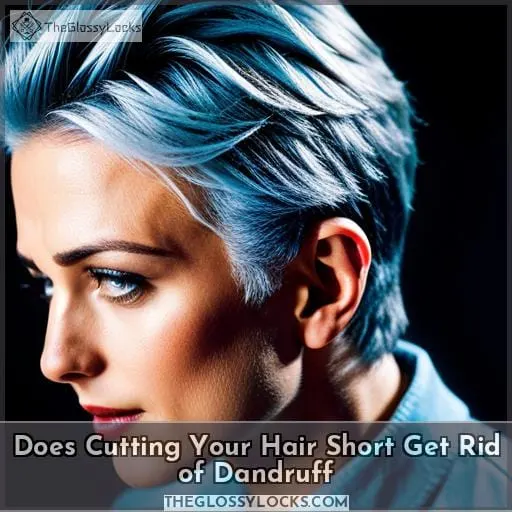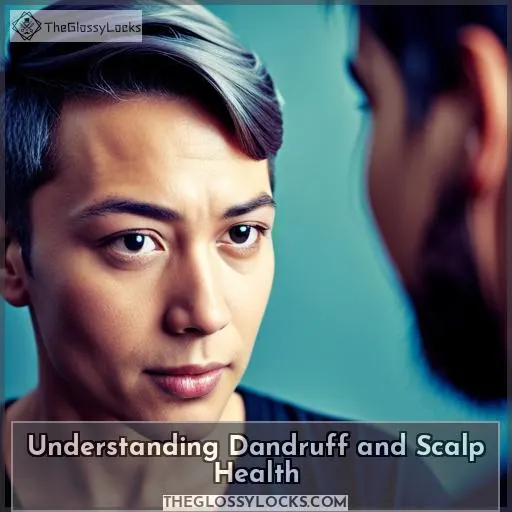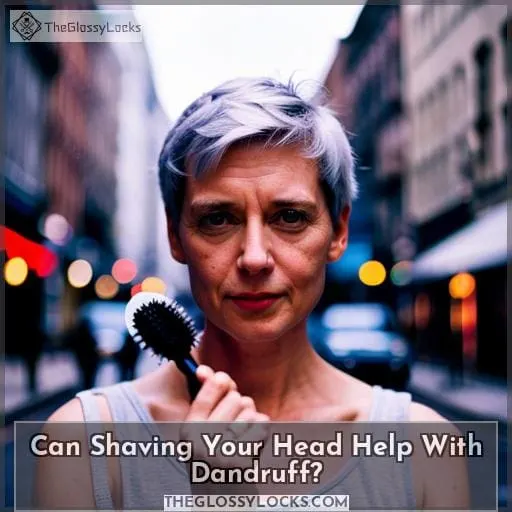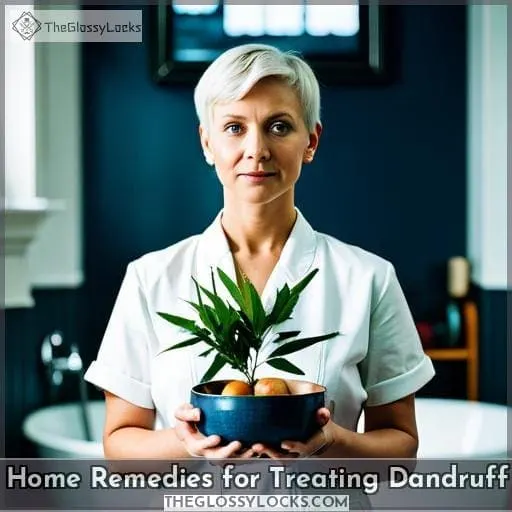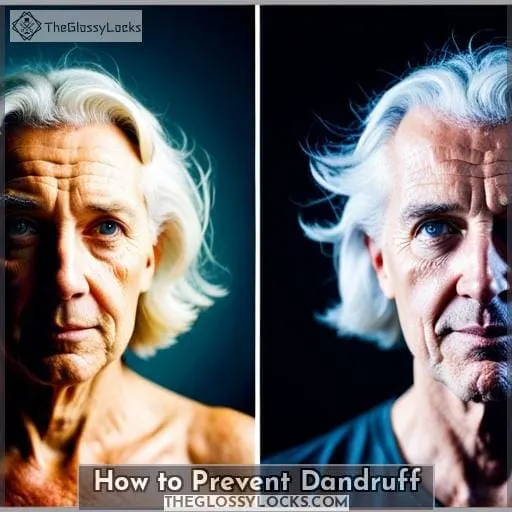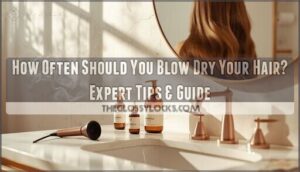This site is supported by our readers. We may earn a commission, at no cost to you, if you purchase through links.
Dandruff is a common problem that affects many people, even those with short hair.
As the old adage goes, prevention is better than cure, so understanding how to prevent and treat dandruff can help keep it under control. In this article, we will explore the relationship between hair length and scalp health to understand whether cutting your hair short can effectively reduce or eliminate dandruff symptoms.
We’ll also discuss home remedies for treating and preventing dandruff, as well as when you should see a dermatologist for more serious cases of flaking or irritation on the scalp.
Table Of Contents
- Key Takeaways
- What Causes Dandruff?
- Understanding Dandruff and Scalp Health
- The Relationship Between Hair Length and Dandruff
- Can Shaving Your Head Help With Dandruff?
- Home Remedies for Treating Dandruff
- How to Prevent Dandruff
- When to See a Dermatologist for Dandruff
- Frequently Asked Questions (FAQs)
- Conclusion
Key Takeaways
- Shorter haircuts could help reduce sweating and allow for better access to treat dandruff flare-ups.
- Removing dead ends from longer hair may prevent flakes from accumulating.
- Shaving your head can help reduce dandruff symptoms and gain better access to the scalp for treatments.
- With the right treatments and lifestyle changes, dandruff can be effectively managed, regardless of hair length.
What Causes Dandruff?
You may not realize it, but dandruff can be caused by everything from hormonal imbalances to scalp oils and weather conditions. Fluctuations in hormones or stress levels can contribute to flare-ups, while build-up of hair products and pollution will worsen the condition.
Dr. Weiser explains that oleic acid is produced when Malassezia breaks down sebum on your scalp, leading to dandruff as a result of excessive oil production or infrequent cleansing of the scalp which accumulates dead skin cells on top of it all.
Poor nutrition – high carb foods, sugary snacks, or dairy, for example – can also lead to an overgrowth in yeast levels found on the skin’s surface.
Though external factors like these play a role in causing dandruff, there are some internal ones too. A lack of nourishment tends to cause dryness which leads your body to produce more sebum than necessary – exacerbating already existing symptoms.
Lemon juice has antimicrobial properties that help keep yeast at bay, while apple cider vinegar, a natural alternative for balancing scalp pH, contains both anti-inflammatory and antimicrobial components ideal for reducing inflammation due to its acetic acid content washing hair with ACV
.
However, dermatologists are divided about using ACV specifically for treating dandruff since its effectiveness varies depending on how severe each individual case is.
In short, cutting one’s hair short isn’t necessarily going to alleviate any potential underlying causes such as those mentioned above – however, shorter styles might make it easier to hide flakes if they do occur! Thicker tresses tend to increase the likelihood of worsening, whereas thinner growth means less sweating and greater ventilation for prevention purposes.
Understanding Dandruff and Scalp Health
Learning about the causes, symptoms, and treatments of dandruff can help you keep your scalp healthy. Dandruff is a mild form of seborrheic dermatitis that appears as redness, flakiness, or itchiness on the scalp.
It is important to understand that cutting hair short may not necessarily get rid of dandruff. Rather, it is related to changes on the scalp, such as hormonal fluctuations or excessive oil production caused by Malassezia microbes, which thrive in warm and humid environments.
Scalp exfoliation with sea-salt granules that dissolve is recommended for removing dead skin cells from the surface layer. Natural oils like olive oil nourish and protect scalps from further damage due to dryness or irritation.
Dr. Gabriel Dean at Harvard Medical School recommends using specialized anti-dandruff shampoos containing zinc pyrithione, ketoconazole, and selenium sulfide for reducing inflammation, alongside apple cider vinegar, which has antifungal properties capable of decreasing levels of yeast on our skin when used alongside other remedies like tea tree oil.
It’s also important to practice good hygiene habits, such as washing our hair regularly, so oils and dead skin don’t accumulate, causing more dandruff flare-ups. Eating nutritious foods and avoiding high-carb, sugary dairy products, while staying hydrated, will all contribute towards keeping our scalps healthy over time.
For those prone to recurring bouts, it might be worth considering chic bobs/lobs instead because having shorter locks makes accessing one’s scalp easier, meaning quicker treatment times.
The Relationship Between Hair Length and Dandruff
Knowing how hair length can affect your dandruff is important for managing symptoms. Natural oils on the scalp are essential to keep it healthy, but when produced in excess, they can lead to a dandruff problem.
Maintaining good scalp hygiene and adapting hair styling techniques accordingly is key for relieving or preventing further outbreaks of seborrheic dermatitis caused by the fungus Malassezia.
Here’s a list of tips for keeping your scalp and locks free from flakes:
- Make sure you wash your hair regularly with an anti-dandruff shampoo.
- Use natural oil treatments such as egg yolk or olive oil.
- Consider making diet changes that reduce sugar intake, as this has been linked to increased levels of yeast on the skin.
- Avoid using too many products like gel, mousse, and hairspray, which may cause build-up leading to flaking.
- Opting for shorter haircuts could help reduce sweating from longer locks while allowing better access if needed when treating any flare-ups.
Ultimately, taking preventative steps such as ensuring good personal hygiene habits will always be beneficial, whether you opt for longer or shorter styles. Pay attention not only to what kind of hairstyle best suits you but also consider what type allows easier maintenance.
Opting out from complicated updos might just do wonders! Keeping track of how much product you use, frequency in washing routines, along with enforcing healthier eating habits are all part of creating a balance between hydration needs and controlling excessive oily production, two major players behind increasing risk factors associated with developing dandruff issues over time.
Can Shaving Your Head Help With Dandruff?
Shaving your head could be a great way to reduce dandruff symptoms and gain better access to the scalp for treatments. According to Dr. Joshua Zeichner, director of cosmetic and clinical research in dermatology at Mount Sinai Hospital, shaving can help with dandruff as it reduces oil production on the scalp by removing hair follicles that contain sebaceous glands responsible for producing excess oil.
Additionally, removing dead ends from longer hair may prevent flakes from accumulating.
However, keep in mind that shaving alone is not enough to get rid of dandruff caused by Malassezia globosa yeast overgrowth or an increase of sebum production due to hormonal fluctuations or stress. Regular exfoliation using specialized shampoos containing tea tree oil or apple cider vinegar can also help balance natural oils while providing anti-inflammatory properties needed for healthy skin.
Here’s a table summarizing how different factors affect both short and long hair:
| Factors | Short Hair | Long Hair |
|---|---|---|
| Oil Production | Reduced due to removal of follicles containing sebaceous glands | Increased surface area means more chance for buildup |
| Scalp Exfoliation | Might be easier without having obstacles like strands getting in the way. | May require extra attention because there are more areas where build-up might occur. |
| Treatments (like tea tree oil) absorption rate | Might absorb better since there’s no barrier between product and scalp. | Might have trouble penetrating through thicker strands. |
| Ease Of Access For Treatments & Cleaning Scalp Meticulously | Makes accessing all parts very easy so treatment application gets uniform coverage. | Requires sectioning off smaller portions which takes time |
| Risk Of Irritation Due To Products Or Procedures | Mild irritation prone if done incorrectly but this will pass quickly since hairs grow back faster than longer ones do after being shaved off. | Longer hairs take much longer time before they come back, so if an issue arises from the scalp it might take a while to fix. |
In summary, shaving your head can be beneficial for reducing oil production and gaining easy access to treat dandruff on the scalp. However, keep in mind that there are other factors at play when it comes to treating dandruff such as exfoliation and using anti-inflammatory products like tea tree oil or apple cider vinegar.
It is recommended to consult with a dermatologist like Dr. Zeichner before making any drastic changes to your hair care routine or treatments as they may provide personalized recommendations based on individual needs.
Home Remedies for Treating Dandruff
You can try a variety of home remedies to treat dandruff, from scalp exfoliators and specialized shampoos to oil-based treatments and apple cider vinegar.
Scalp exfoliation is an effective way to lift the top layer of dry skin on your head, removing dead skin cells that accumulate over time.
Specialized dandruff shampoos with zinc or sulfur help reduce yeast populations in the scalp while also reducing redness and irritation caused by them.
Shampoo containing salicylic acid can assist with simple dryness or flaking while those containing zinc pyrithione, ketoconazole, and selenium sulfide are specifically designed for treating itchy scalps associated with dandruff flareups.
Hot oil treatments have been used historically but cannot effectively treat fungus-related causes alone; however, they may help balance excessive oils found on some scalps that could worsen symptoms when left unaddressed.
Similarly, tea tree oil has anti-microbial properties which contain both anti-inflammatory effects as well as reducing levels of yeast present on the epidermis. However, it should be noted this remedy may not always be sufficient enough compared to others such as shampooing regularly using products enriched with vitamin B.
Apple Cider Vinegar has long been known for its cleansing powers due to its acidic nature. Yet, dermatologists remain divided over their effectiveness at targeting fungal growths causing problems such as Dandruff still being debated amongst experts in this area.
How to Prevent Dandruff
To prevent dandruff, everyday habits are essential. Eating healthy fats and avoiding stress can go a long way in keeping the scalp free from itchy flakes. Regular brushing of hair is key to removing dead skin cells that accumulate on the scalp.
Using moisturizers with green tea extract can help balance oil production and reduce dryness. Keeping hair clean by washing it regularly also helps remove any build-up of dirt or pollutants that could worsen dandruff symptoms.
Opting for a simple short length may be beneficial as far as haircuts go. Shorter styles demand less oil production, which reduces flaking due to dryness. However, this won’t necessarily get rid of all your dandruff woes if you don’t take other preventive measures as well! Apple cider vinegar has antimicrobial properties, which makes it an effective treatment for mild cases.
Its effectiveness varies per person, so consulting with a dermatologist would be advised before taking this route.
Lastly, paying attention to basic hygiene such as showering daily and changing pillowcases often will help keep your scalp fresh and less prone to developing more severe levels of seborrheic dermatitis caused by yeast overgrowth.
When to See a Dermatologist for Dandruff
If you’re noticing persistent dandruff, it may be time to see a dermatologist. Seborrheic Dermatitis is the medical term for the condition and can become worse if not treated properly. Symptoms include redness, flaking, itching, and sometimes swelling of the skin on your scalp.
A dermatologist will likely recommend regular scalp exfoliation with specialized shampoos or products that contain zinc or sulfur to help reduce yeast populations and treat dandruff effectively.
Oil treatments such as hot oil massages followed by a light rinse are another option when looking at ways to manage seborrheic dermatitis, but they won’t necessarily get rid of all signs completely. This is especially true if you have longer hair since it’s more difficult for treatment applications like these to reach beneath those layers! Olive-oil braids left overnight are also great alternatives; however, heavier application means itchier hair in some cases, so make sure not to choose this route too often unless otherwise instructed by your doctor/dermatologist.
For stubborn white flakes still appearing after trying these methods out yourself, then seeing an expert should definitely be considered.
Frequently Asked Questions (FAQs)
Are there any lifestyle changes I can make to reduce dandruff?
To reduce dandruff, it is recommended to wash your hair regularly, maintain a balanced diet with healthy fats, and use moisturizers that contain green tea extract. While cutting your hair short may not completely eliminate dandruff, it could help prevent flakes from falling when the hair is down.
Additionally, consider using specialized shampoos that contain zinc or sulfur to treat redness and irritation.
Is there any way to tell if I have dandruff or psoriasis?
Dandruff is typically identified by red, flaky skin accompanied by itching, while psoriasis may appear as thicker pink or red plaques with silver-white scales. A skilled dermatologist can provide a diagnosis and differentiate between the two conditions by conducting a physical examination of the scalp.
Are there any natural remedies for dandruff?
Yes, there are natural remedies for dandruff. Scalp exfoliators can lift dry skin and remove dead cells, while specialized shampoos can reduce yeast populations. Oil-based treatments can balance oil production, and apple cider vinegar has antimicrobial properties to lower levels of yeast on the skin.
Tea tree oil also helps soothe inflammation, while charcoal or sea salt granules can gently exfoliate the scalp.
How often should I wash my hair if I have dandruff?
If you have dandruff, it is important to wash your hair at least twice a week. Use specialized dandruff shampoo that contains zinc or sulfur and massage it into the scalp for five minutes each time. Consider using oil-based treatments to balance excessive oils on the scalp if needed.
This can help reduce the severity of symptoms and keep your scalp healthy in the long run.
What are the benefits of shaving my head for dandruff?
Shaving your head for dandruff can provide relief from redness and itching. It allows easier access to the scalp so that treatments, such as specialized shampoos with zinc or sulfur, can be more effective.
Shorter hair also demands less oil production, which may help reduce dryness and further symptoms of dandruff.
Conclusion
Dandruff is a common issue that can be managed with the right treatments and lifestyle changes. While it may seem tempting to cut your hair short to get rid of dandruff, it’s not a guaranteed fix. Choosing the right length of hair for you and keeping it clean and healthy is the best way to prevent and manage dandruff.
From using specialized shampoos to maintaining a balanced diet, there are numerous ways to fight dandruff and keep your scalp looking and feeling healthy.

